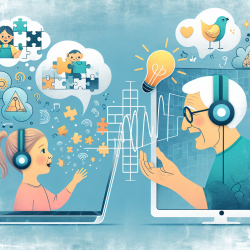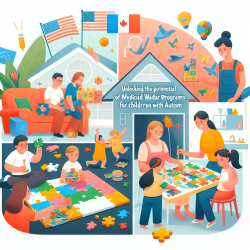In the realm of special education, staying abreast of the latest research and integrating its findings into practice is crucial for providing the best possible support to students. One significant area of research that can be leveraged is the return of genetic research results (RoRR). The study "Return of research results (RoRR) to the healthy CHRIS cohort: designing a policy with the participants" offers valuable insights that can enhance the skills of practitioners, particularly those involved in online therapy services like those provided by TinyEYE.
Key takeaways from the study emphasize the importance of participant autonomy in the disclosure of genetic results. Practitioners can implement these findings by adopting a participant-centered approach in their practice. Here are some actionable steps based on the research outcomes:
- Empower Decision-Making: Just as the CHRIS study highlighted the need for participants to make autonomous decisions regarding their genetic results, practitioners should empower students and their families to make informed decisions about their therapy and educational plans. This can be achieved by providing comprehensive information and fostering an environment where questions and discussions are encouraged.
- Enhance Communication: Effective communication is paramount. Practitioners should ensure that information about therapy plans, progress, and any relevant findings are communicated clearly and understandably. This mirrors the study's approach of providing easily accessible information to participants.
- Collaborate with Specialists: The study underscores the importance of involving genetic counselors and other specialists in the feedback process. Similarly, practitioners should collaborate with various specialists (e.g., speech therapists, occupational therapists) to provide holistic support to students.
- Address Anxiety and Concerns: One of the primary reasons participants in the study declined genetic results was the fear of anxiety. Practitioners should be mindful of the emotional and psychological impacts of therapy and educational plans on students and their families. Offering support through counseling and open dialogue can help alleviate these concerns.
- Continuous Education: Just as the study identified a need for genetic education among participants, practitioners should engage in continuous professional development to stay updated with the latest research and best practices. Attending conferences, webinars, and networking events can provide valuable learning opportunities.
By integrating these principles into practice, practitioners can enhance their skills and provide more effective support to students. Encouraging further research and staying informed about the latest developments in genetic research and other relevant fields can also contribute to continuous improvement in special education services.
To read the original research paper, please follow this link: Return of research results (RoRR) to the healthy CHRIS cohort: designing a policy with the participants.










